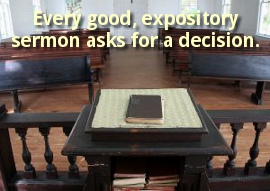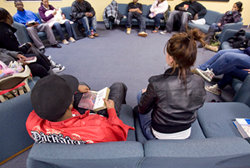Preaching Worth Listening To
 An address to the American Association of Christian Colleges and Seminaries at their annual meeting, Feb. 2006. A PDF version is available at the PTC website.
An address to the American Association of Christian Colleges and Seminaries at their annual meeting, Feb. 2006. A PDF version is available at the PTC website.
As iron sharpens iron,
one person sharpens another. (Proverbs 27:17)
 An address to the American Association of Christian Colleges and Seminaries at their annual meeting, Feb. 2006. A PDF version is available at the PTC website.
An address to the American Association of Christian Colleges and Seminaries at their annual meeting, Feb. 2006. A PDF version is available at the PTC website.
Poll Results
How should the church respond to a professing Christian man who wears an earring and wants to become a member of the assembly?
Let him join and fully participate in the ministry. Votes: 24
Let him join, but limit his participation in the ministry (no leadership or teaching rolls). Votes: 5
Deny him membership. Votes: 0
Deny him membership and continually confront him about his sin until he either gets rid of the earring or leaves. Votes: 2
 Republished with permission from Baptist Bulletin May/June 2011. All rights reserved.
Republished with permission from Baptist Bulletin May/June 2011. All rights reserved.
Can churches create compassionate social ministries in their communities without inadvertently becoming sidetracked from their essential gospel motivation?
The question is not new—a promising young German seminarian slipped down this path in the 1880s. “The idea came to me that I ought to be a preacher, and help to save souls. I wanted to go out as a foreign missionary—I wanted to do hard work for God,” Walter Rauschenbusch said in 1913. “Indeed, one of the great thoughts that came upon me was that I ought to follow Jesus Christ in my personal life, and die over again his death,…and it was that thought that gave my life its fundamental direction in the doing of Christian work” (Rauschenbusch, “The Kingdom of God” in The Social Gospel in America, 1870–1920).
Rauschenbusch, who began his ministry with an orthodox view of salvation, would later become known as “the father of the social gospel.” Regrettably, once he became pastor in the Hell’s Kitchen district of New York City, he preached a different gospel, altering his Biblical message to address social ills such as poverty, unemployment, and malnutrition. In the process, Rauschenbusch lost his emphasis on Christ’s atoning sacrifice for the sinner.
Even today Christians tamper with the gospel message, as Rauschenbusch did, applying his ideas to our modern problems.
Poll Results
How Much Influence Does A Church’s Stand Have On Divorce?
Much influence; people who attend a church in which the leaders emphasize marital commitment are much less likely to divorce. Votes: 3
Some influence that might have an effect in a few cases. Votes: 2
Most unhappy Christians bent on divorce are going to divorce no matter what we preach. Votes: 2
Churches that talk tough have no better stats that those who do not Votes: 3
Other Votes: 2
Discussion